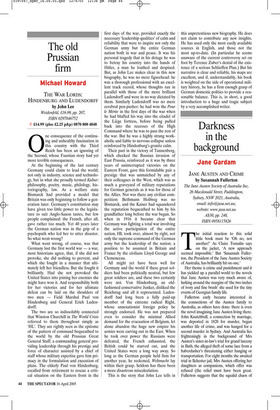The old Prussian firm
Michael Howard
THE WAR LORDS: HINDENBURG AND LUDENDORFF by John Lee Weidenfeld, £16.99, pp. 207, ISBN 0297846752 ✆ £14.99 (plus £2.25 p&p) 0870 800 4848 One consequence of the continuing and unhealthy fascination in this country with the Third Reich has been an ignoring of the Second, whose Faustian story had yet more terrible consequences.
At the beginning of the last century Germany could claim to lead the world; not only in industry, science and technology, but in what she proudly termed Kultur: philosophy, poetry, music, philology, historiography, law. As a welfare state Bismarck had provided a model that Britain was only beginning to follow a generation later. Germany’s constitution may have given too little power to the legislature to suit Anglo-Saxon tastes, but few people complained: the French, after all, gave rather too much. Yet 40 years later the German nation was in the grip of a psychopath who led her to utter disaster. So what went wrong?
What went wrong, of course, was that Germany lost the first world war — a war, most historians agree, that, if she did not provoke, she did nothing to prevent, and which she fought in a manner that ultimately left her friendless. But she fought it brilliantly. Had she not provoked the United States into joining her enemies she might have won it. And responsibility both for her victories and for her ultimate defeat can be laid on the shoulders of two men — Field Marshal Paul von Hindenburg and General Erich Ludendorff.
The two are so indissolubly connected that Winston Churchill in The World Crisis referred to them throughout simply as ‘HL’. They are rightly seen as the epitome of the pattern of command bequeathed to the world by the old Prussian Great General Staff; a commanding general providing leadership through his prestige and force of character assisted by a chief of staff whose military expertise gave him primacy in the formulation and execution of plans. The elderly Paul von Hindenburg, recalled from retirement to rescue a critical situation on the Eastern front in the first days of the war, provided exactly the necessary ‘leadership qualities’ of calm and reliability that were to inspire not only the German army but the entire German nation both in war and peace. It was his personal tragedy that in his dotage he was to betray his country into the hands of Hitler, a man he loathed and despised. But, as John Lee makes clear in this new biography, he was no mere figurehead: he was a thorough professional with an excellent track record, whose thoughts ran in parallel with those of the more brilliant Ludendorff and were in no way dictated by them. Similarly Ludendorff was no mere cerebral pen-pusher: he had won the Pour le Mérite in the first days of the war when he had bluffed his way into the citadel of the Liège fortress, before being pulled back into the recesses of the High Command where he was to pass the rest of the war. But he was a highly strung workaholic and liable to nervous collapse unless reinforced by Hindenburg’s granite calm.
Their part in the victory of Tannenberg, which checked the Russian invasion of East Prussia, reinforced as it was by three years of uninterrupted victories on the Eastern Front, gave this formidable pair a prestige that was unmatched by any of their colleagues in the West, which was as much a graveyard of military reputations for German generals as it was for those of the Allies. Nor was there any civilian competition: Bethmann Hollweg was no Bismarck, and the Kaiser had squandered the reputation bequeathed to him by his grandfather long before the war began. So when in 1916 it became clear that Germany was fighting a total war involving the active participation of the entire nation, HL took over, almost by right, not only the supreme command of the German army but the leadership of the nation; a position to be assumed in Britain and France by the civilians Lloyd George and Clemenceau.
All might yet have been well for Germany and the world if these great soldiers had been politically neutral, but few great soldiers are, and these two certainly were not. Von Hindenburg, an oldfashioned conservative Junker, disliked the Reichstag and all it represented. Ludendorff had long been a fully paid-up member of the extreme radical Right, whose annexationist foreign policy he strongly endorsed. He was not prepared even to consider the minimal Allied demand for the evacuation of Belgium, let alone abandon the huge new empire his armies were carving out in the East. When he took over power the Russians were defeated, the French exhausted, the British could be starved out, and the United States were a long way away. So long as the German people held firm for another year, he reckoned, Weltmacht lay within their grasp. Seldom has there been a more disastrous miscalculation.
This is the story that John Lee tells in this unpretentious new biography. He does not claim to contribute any new insights. He has used only the most easily available sources in English, and those not the most up-to-date. (In particular he seems unaware of the current controversy set on foot by Terence Zuber’s denial of the existence of a serious Schlieffen Plan.) But his narrative is clear and reliable, his maps are excellent, and if, understandably, his book is weighted on the side of operational military history, he has a firm enough grasp of German domestic politics to provide a reasonable balance. This is, in short, a good introduction to a huge and tragic subject by a very accomplished writer.
























































 Previous page
Previous page